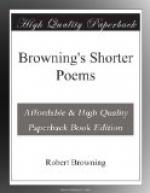SAUL. (PAGE 196.)
This is generally regarded as one of Browning’s greatest poems. Even his detractors concede to it beauty of form, fervor of feeling, and richness of imagery. The incident upon which it is based is found in 1 Samuel, chapter xvi. Saul is in the depths of mental eclipse, and David has been summoned to cure him by music. The young shepherd sings to him first the songs that appeal to the gentle animals; then the songs that men use in their human relationships,—songs of labor, of the wedding-feast, of the burial-service, of worship; then he sings the joy of physical life, ending in an appeal to the ambition of King Saul. Saul is roused, but not yet brought to will to live. So David sings anew of the life of the spirit, the spirit of Saul living for his people. Then a touch of tenderness from the king flashes into David a prophetic insight: If he, the imperfect, would do so much for love of Saul, what would God, the all-perfect, do for men? And so he reaches the conception of the Christ, the incarnation.
The poem is full of echoes of the Old Testament, fused with the spirit of modern Christianity and modern thinking. It is touched here and there with bits of beauty from Oriental landscape. The long, even swell of the lines carries one along with no sense of the roughness so common in Browning’s verse. Rising by steady degrees to the climax, we feel, like David, some sense of the “terrible glory,” some sense of the unseen presences that hovered around him as he made his way home in the night.
ONE WORD MORE. (PAGE 224).
One Word More was appended to Browning’s volume Men and Women (1855), by way of dedication of the book to his wife. It is characteristic of its author in its reality of feeling, in its seeking an unusual point of view, in its parenthetic and allusive style, and its occasional high felicity of expression. Those who feel overpowered by Browning’s vigor and profundity of thought, might stop here to note the exquisite inconsistency between the examples cited and the thing thus illustrated. The painter turning poet, the poet turning painter, the moon turning her unseen face to a mortal lover; these are compared to Browning the poet,—writing another poem. The only difference in his art is that the poet here speaks for himself in the first person, and not, as usual, dramatically in the third person. The idea of the poem may be found, stripped of digression and fanciful comparisons, in the eighth, twelfth, fourteenth, seventeenth, and eighteenth stanzas. Something of the same idea appears in My Star.
5. =Rafael,= etc. More commonly spelled Raphael. Born in Italy in 1483, died in 1520; generally regarded as the greatest of painters. The Sistine Madonna, at Dresden, is considered his greatest work. See lines 21-24.




